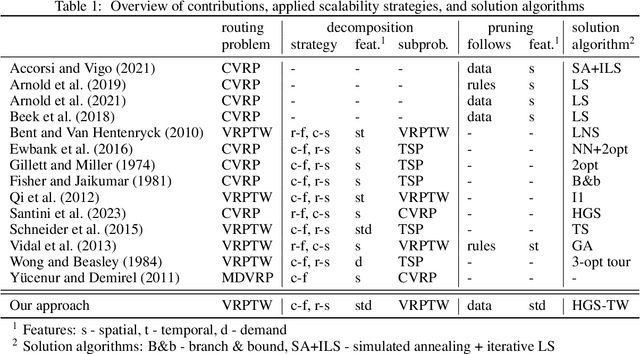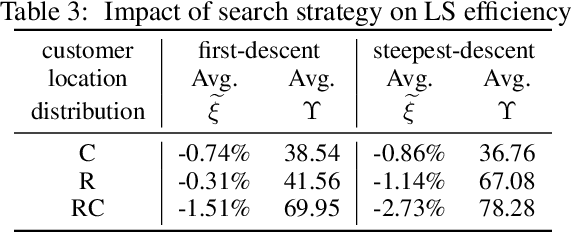Christoph Kerscher
Spatial-temporal-demand clustering for solving large-scale vehicle routing problems with time windows
Jan 20, 2024



Abstract:Several metaheuristics use decomposition and pruning strategies to solve large-scale instances of the vehicle routing problem (VRP). Those complexity reduction techniques often rely on simple, problem-specific rules. However, the growth in available data and advances in computer hardware enable data-based approaches that use machine learning (ML) to improve scalability of solution algorithms. We propose a decompose-route-improve (DRI) framework that groups customers using clustering. Its similarity metric incorporates customers' spatial, temporal, and demand data and is formulated to reflect the problem's objective function and constraints. The resulting sub-routing problems can independently be solved using any suitable algorithm. We apply pruned local search (LS) between solved subproblems to improve the overall solution. Pruning is based on customers' similarity information obtained in the decomposition phase. In a computational study, we parameterize and compare existing clustering algorithms and benchmark the DRI against the Hybrid Genetic Search (HGS) of Vidal et al. (2013). Results show that our data-based approach outperforms classic cluster-first, route-second approaches solely based on customers' spatial information. The newly introduced similarity metric forms separate sub-VRPs and improves the selection of LS moves in the improvement phase. Thus, the DRI scales existing metaheuristics to achieve high-quality solutions faster for large-scale VRPs by efficiently reducing complexity. Further, the DRI can be easily adapted to various solution methods and VRP characteristics, such as distribution of customer locations and demands, depot location, and different time window scenarios, making it a generalizable approach to solving routing problems.
 Add to Chrome
Add to Chrome Add to Firefox
Add to Firefox Add to Edge
Add to Edge